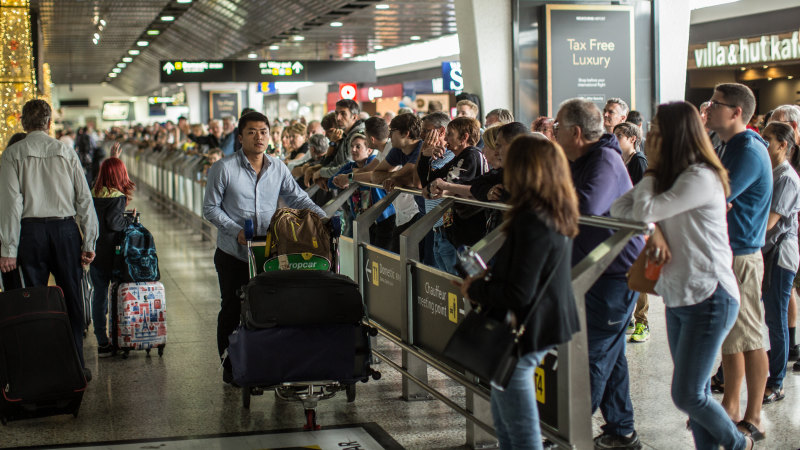Premiers want greater say on immigration as they push for more money for infrastructure

Save articles for later
Add articles to your saved list and come back to them any time.
State premiers are seeking a bigger say on the country’s migration intake out of growing concern at the population pressures in the major cities, as they slam the federal government for cancelling funds for road and rail projects.
Angry at the $11 billion cut to future projects, the premiers want to overhaul the visa system to give state authorities the right to name the skilled occupations they need to fill their worker shortages, setting the terms for reforms to be revealed within weeks.
Premiers want to overhaul the visa system to give state authorities the right to name the skilled occupations they need to fill their worker shortages,Credit: Scott McNaughton
The push comes as the migration intake surges past the federal government’s forecast for 400,000 in the past year and appears to be on track to reach almost 500,000 a year unless the government outlines new measures to contain the growth.
NSW Premier Chris Minns called on Monday for more federal help to deal with the state’s growing population after Victorian Premier Jacinta Allan warned against the federal infrastructure changes and Queensland counterpart Annastacia Palaszczuk attacked the “outrageous” cuts to future projects.
The joint position on migration, agreed by all states and territories, is to set up a new mechanism that would give their agencies a direct say over the new and emerging occupations that are given priority in the visa program, saying this would help each government meet the “unique needs” of its economy.
“States and territories require similar input into any new approach to identifying which skilled migrants enter our labour markets,” they said in a submission to the government’s migration review.
The proposal was put to the federal government by the Council of the Australian Federation, which represents the states and territories, and sources confirmed it remained the shared position as premiers and chief ministers prepare for a national cabinet meeting with Prime Minister Anthony Albanese next month.
In a separate submission to the review, the NSW government also pushed for new federal programs to give migrants an incentive to go to regional areas, easing pressure on the cities, and it called for more skilled workers across the state in areas like health and childcare.
“NSW is expected to face a shortfall of 73,000 workers in the aged care and disability sector by 2030,” the state said in its submission to the migration review.
“Employment in hospitals is projected to grow by 17 per cent by 2026, while there is projected to be a national shortfall of 11,400 general practitioners by 2030.”
In its separate submission, the Queensland government warned that its state had the highest population growth but too little input into the migration intake.
“Currently, there is little state and territory visibility into how interim and final allocations are determined by the Australian government,” it said.
Immigration Minister Andrew Giles signalled the changes to the visa system on Monday by saying the government would reveal its migration strategy “shortly” and saying it would lead to a fairer system.
The new migration strategy will respond to a review led by former public service chief Martin Parkinson, now the chancellor of Macquarie University, who delivered the review in April after being asked to study the problem in October last year.
The May budget forecast net overseas migration of 400,000 in the 2023 financial year and said this would fall to 315,000 in the 2024 financial year, but the actual numbers show the intake is ahead of the forecasts due to large numbers of students and temporary workers coming to Australia.
The annual intake over the year to September 30 was close to 500,000, said former immigration department deputy secretary Abul Rizvi, an independent commentator on the issue.
“To get the net overseas migration down, the government must further tighten student policy and temporary graduate policy,” he said.
Palaszczuk has strongly criticised federal Transport Minister Catherine King, who represents the Victorian electorate of Ballarat, for cancelling funding to Queensland projects in last week’s overhaul of the federal infrastructure program.
“My message is to the Victorian minister Catherine King, the federal Victorian minister who doesn’t understand Queensland: come up to Queensland and have a look, have a discussion with us, and fund Queensland infrastructure projects,” she said.
Minns said NSW citizens contributed more than a third of federal taxation revenue and deserved more support on road and rail projects when the population was growing.
“There are a lot of things that are in abeyance at the moment that we do need clarity on, and NSW taxpayers deserve their fair share,” the NSW premier said on Monday.
“NSW taxpayers contribute an enormous amount of money to the Commonwealth budget, but we need that back, particularly when you consider we’ve got the biggest population and we’ve got the biggest expected increase in the population in the coming two years.
“We need critical infrastructure to keep this state going, to keep the economy moving and that can only happen from the deeper pockets of the Commonwealth government.”
Allan said last week it was “incredibly frustrating” that Victoria would lose federal support for major projects including the faster rail service between Melbourne and Geelong, the Baxter rail extension at Frankston, and a highway bypass at Shepparton.
Cut through the noise of federal politics with news, views and expert analysis from Jacqueline Maley. Subscribers can sign up to our weekly Inside Politics newsletter here.
Most Viewed in Politics
From our partners
Source: Read Full Article
